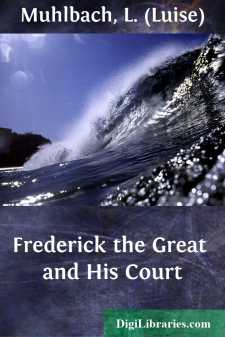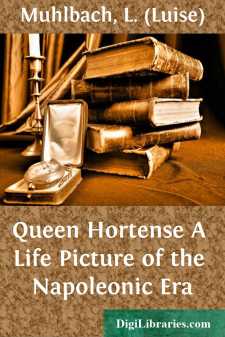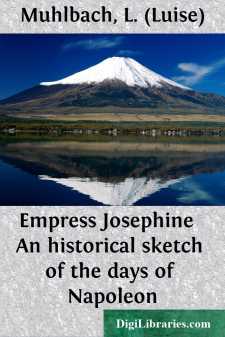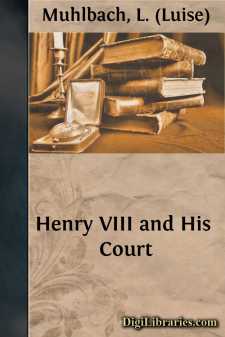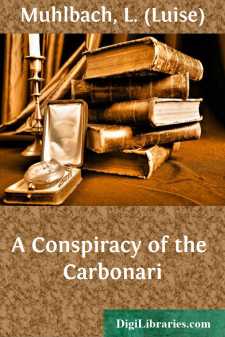Categories
- Antiques & Collectibles 13
- Architecture 36
- Art 48
- Bibles 22
- Biography & Autobiography 813
- Body, Mind & Spirit 142
- Business & Economics 28
- Children's Books 17
- Children's Fiction 14
- Computers 4
- Cooking 94
- Crafts & Hobbies 4
- Drama 346
- Education 46
- Family & Relationships 57
- Fiction 11829
- Games 19
- Gardening 17
- Health & Fitness 34
- History 1377
- House & Home 1
- Humor 147
- Juvenile Fiction 1873
- Juvenile Nonfiction 202
- Language Arts & Disciplines 88
- Law 16
- Literary Collections 686
- Literary Criticism 179
- Mathematics 13
- Medical 41
- Music 40
- Nature 179
- Non-Classifiable 1768
- Performing Arts 7
- Periodicals 1453
- Philosophy 64
- Photography 2
- Poetry 896
- Political Science 203
- Psychology 42
- Reference 154
- Religion 513
- Science 126
- Self-Help 84
- Social Science 81
- Sports & Recreation 34
- Study Aids 3
- Technology & Engineering 59
- Transportation 23
- Travel 463
- True Crime 29
L. (Luise) Muhlbach
L. (Luise) Mühlbach, the pen name of Clara Mundt (1814–1873), was a prolific German writer renowned for her historical novels. Her works, such as "Frederick the Great and His Court," gained immense popularity in the 19th century for their detailed and vivid portrayal of European history. Mühlbach's novels, often blending historical facts with fiction, were widely read and translated, contributing significantly to the historical novel genre.
Author's Books:
Sort by:
CHAPTER I. The palace glittered with light and splendor; the servants ran here and there, arranging the sofas and chairs; the court gardener cast a searching glance at the groups of flowers which he had placed in the saloons; and the major domo superintended the tables in the picture gallery. The guests of the queen will enjoy to-night a rich and costly feast. Every thing wore the gay and festive...
more...
CHAPTER I. DAYS OF CHILDHOOD. "One moment of bliss is not too dearly bought with death," says our great German poet, and he may be right; but a moment of bliss purchased with a long lifetime full of trial and suffering is far too costly. And when did it come for her, this "moment of bliss?" When could Hortense Beauharnais, in speaking of herself, declare, "I am happy? Now, let...
more...
THE KING'S RECOLLECTIONS. "Well," said the king, "whenever I look back into the past, every thing seems to me covered with a gray mist, through which only two stars and two lights are twinkling. The stars are your eyes, and the lights are the two days I alluded to before—the day on which I saw you for the first time, and the day on which you arrived in Berlin. Oh, Louisa, never shall...
more...
The dark clouds which hung yet over the future of Napoleon Bonaparte, the lieutenant of artillery, were gathering in heavier and heavier masses over all France, and already were overshadowing the throne of the lilies. Marie Antoinette had already abandoned the paradise of innocency in Trianon, and when she came there now it was to weep in silence, to cast away the mask from her face, and under the garb...
more...
CHAPTER I. THE FESTIVAL. The sufferings of the long war still continued; still stood Frederick the Great with his army in the field; the tremendous struggle between Prussia and Austria was yet undecided, and Silesia was still the apple of discord for which Maria Theresa and Frederick II. had been striving for years, and for which, in so many battles, the blood of German brothers had been spilt....
more...
CHAPTER I. CHOOSING A CONFESSOR. It was in the year 1543. King Henry the Eighth of England that day once more pronounced himself the happiest and most enviable man in his kingdom, for to-day he was once more a bridegroom, and Catharine Parr, the youthful widow of Baron Latimer, had the perilous happiness of being selected as the king's sixth consort. Merrily chimed the bells of all the steeples of...
more...
CHAPTER I. AFTER ESSLINGEN. It was the evening of the 22d of May, 1809, the fatal day inscribed in blood-stained letters upon the pages of history, the day which brought to Napoleon the first dimming of his star of good fortune, to Germany, and especially to Austria, the first ray of dawn after the long and gloomy night. After so many victories and triumphs; after the battles of Tilsit, Austerlitz, and...
more...


